UPDATE: Now you can also see a video of my presentation.
The writing instructor told us to choose a Wisdom Figure to write about.
I had to wrap my head around the term for a moment. Who is a wisdom figure to me?
I guess I should list Moses or Jesus or one of those bible guys. My high school drama teacher inspired me. But wisdom figure? The whole concept sort of stumped me.
And then I had a revelation.
Okay, so he's got pointy ears. Yes, he's from another planet. Yes, he lacks emotions. Yes, he's fictional. But Spock is there, in my memory, in my views of the world, in the views of my own life. He stands there erect, hands clasped behind his back in an "at ease" position that I still mimic to this day.
He's loyal. Rational. Yes, I have to say it, he's logical. He appreciates the scientific method. And while he maintains a cool reserve, we all know that underneath he's got a seething cauldron of raw feelings boiling away, kept under control by a single upturned eyebrow. Puzzles are a challenge, a way to learn. And he usually handles conflict with a zen-like detachment.
He's a stranger amidst a crew of irrational humans, trying to understand the foreign language of emotional responses. For a kid who kept moving to new houses, new cities, new friends, why not rely on someone constant, someone whose judgment you could trust, who would loyally appear in your living room weekday afternoons at 4.
Spock as Wisdom Figure. Why not?
What could be a better greeting than Live Long and Prosper? It’s the first indication that the renowned Vulcan “logic” is not just lifeless and computational. It’s a philosophy of rationality, yes, but also of radical empathy. And it’s a blessing. Famously, Leonard Nimoy based the salute on a gesture he once saw a Rabbi perform.
Vulcans also celebrate diversity. This symbol – perhaps created cynically by Gene Roddenberry as a way to sell jewelry – represents the IDIC , or Infinite Diversity in Infinite Combinations. It’s a cornerstone of Vulcan philosophy and it makes sense. It’s logical to understand that the universe derives power from the diversity of its natural phenomena and its differing cultures.
, or Infinite Diversity in Infinite Combinations. It’s a cornerstone of Vulcan philosophy and it makes sense. It’s logical to understand that the universe derives power from the diversity of its natural phenomena and its differing cultures.
Diversity invites democracy. Diversity is expansive, it invites the embrace of exploration, of change, of growth. It shows that the Logic Vulcans practice is not cold and computational. It affirms life and peace as well as the triumph of intelligence over force.
Spock says many times that it’s illogical to kill without reason. That’s why he’s a vegetarian, why he’d rather nerve pinch one of his enemies than phaser him out of existence. Spock is part-human, and we can sense that even though he suppresses his emotions, even though he might deny it, he still feels compassion, still feels empathy.
Remember the space hippies ? Spock found common ground with them in their concept of One. “One is the Bginning.” They sought peace, you know, like hippies everywhere, and Spock knew of their ideas, maybe even respected them. He reached out to the hippies in a way that the establishment – Captain Kirk – never could.
? Spock found common ground with them in their concept of One. “One is the Bginning.” They sought peace, you know, like hippies everywhere, and Spock knew of their ideas, maybe even respected them. He reached out to the hippies in a way that the establishment – Captain Kirk – never could.
He even jammed with them. Because Spock digs music. He plays an instrument – the Vulcan harp. Yes, the arts are important to the logical, unemotional Vulcans. And that makes sense. Music can help us reach places that words can’t always touch. It delve deep into our, yes, emotions, and move us in distinctly unrational ways.
And why not? After all, Spock also practices meditation. He contemplates the divide between self and the world, keeps himself in balance between the emotions he feels and the world in which he exists. Contrary to popular belief, Vulcans have emotions, they just keep them under control.
And Spock learned the value of feelings. As you watch the character grow from the original series to the movies
to the movies , you can see the change. In the first movie
, you can see the change. In the first movie he learned that a machine cannot experience the joy of touch, of physically connecting with others. And that experience changed him. Spock learns. He grows. He became comfortable with the balance between his emotional human half and his rational Vulcan self.
he learned that a machine cannot experience the joy of touch, of physically connecting with others. And that experience changed him. Spock learns. He grows. He became comfortable with the balance between his emotional human half and his rational Vulcan self.
By the time of the latest movie , Spock has mellowed significantly. He’s literally a wise old man, a sage who’s extremely comfortable in his own ears, so much that, if you watch closely, he pretty nearly smiles at the end of the film. Fascinating.
, Spock has mellowed significantly. He’s literally a wise old man, a sage who’s extremely comfortable in his own ears, so much that, if you watch closely, he pretty nearly smiles at the end of the film. Fascinating.
He’s also a cheerleader for science. After all, the scientific method is simply the best tool we’ve yet devised to understand our surroundings. Careful experimentation, reason, making choices based on evidence rather than instinct or intuition. Emotions have their place, but reason and evidence usually bring us to the best conclusion.
The philosophy that sums up Spock’s experience? The needs of the many outweigh the needs of the few. You have to apply this idea on a case-by-case basis, of course, and that’s where logic fits in. If killing one person would save a million people from a nasty headache, do the needs of the many still outweigh the needs of the one? Probably not. But it’s worth spending time thinking about how your own personal needs conflict with the needs of the many - and whether there are instances where you might be able to put others' needs first.
And isn’t that the point underlying many of our earth-based philosophies? Some guy named Jesus said lots of stuff about subverting your own needs, your own desires, about giving away what you have and serving others. Spock serves others by operating as a vessel for science. He’s your first officer, your trusted advisor. Your friend. He’s got your back.
Sure, Kirk got the girls. But the girls WANTED Spock. And he truly understood -- if not himself, at least the world - the universe - around him. Maybe, one day, I'll be able to say the same. It's not logical, I know, but maybe, someday, it will be true. After all, sometimes I think he’s actually part of me, lurking deep within, forged in childhood, shaped in high school.
For a district speech contest, I had to perform a dramatic monologue. I chose a selection from Leonard Nimoy's book, I Am Not Spock , an internal dialogue section, in which Nimoy wrestles with the Spock inside himself. “Don’t forget that I’m real and you’re a fictional character,” says Nimoy. “Are you sure?” Spock replies.
, an internal dialogue section, in which Nimoy wrestles with the Spock inside himself. “Don’t forget that I’m real and you’re a fictional character,” says Nimoy. “Are you sure?” Spock replies.
Maybe, inside me, there's still a Spock, a logical creature, trying to get out. I know my wife thinks so. Since I didn’t cry at my wedding, nor at the birth of my children, I must be part Vulcan, she says. And I'll admit I'm insanely jealous of her ability to raise a single eyebrow, a trait that's passed me by, despite years of practice.
•Sources include Charlie Jane Anders “How You Can Live Like A Vulcan Without Bleeding Green” from io9.com
•My sad nerdly brain

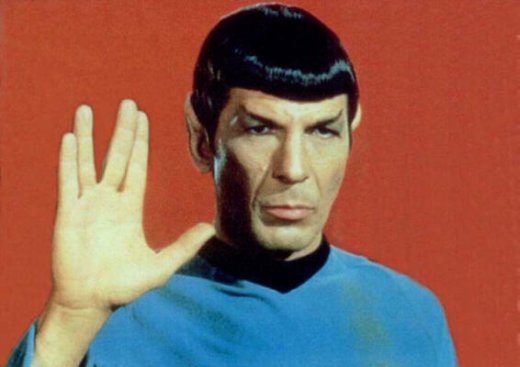



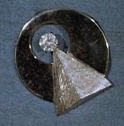

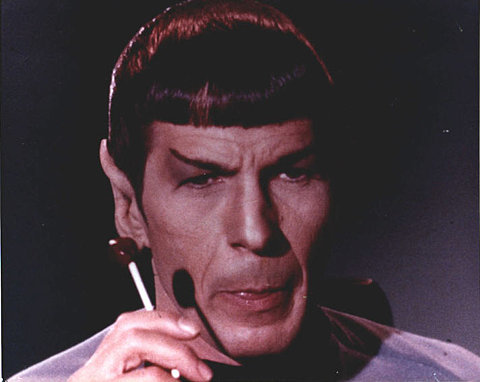

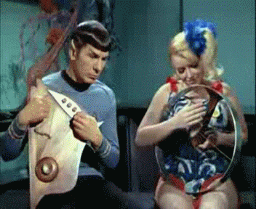
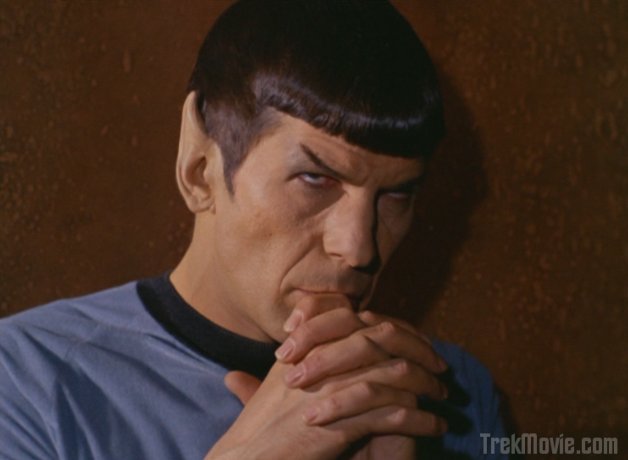





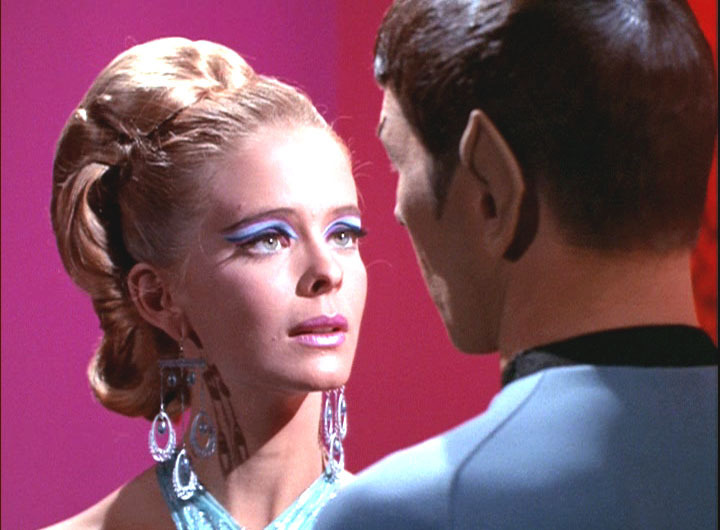

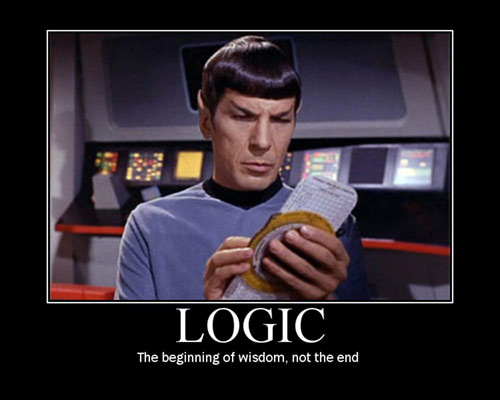




3 comments:
I loved this post.
Btw, you can get your ears surgically altered? How cool is that? Maybe...
Naaaahhh.
:D
Fascinating.
Logic often leads to unexpected insights and understanding.
Post a Comment